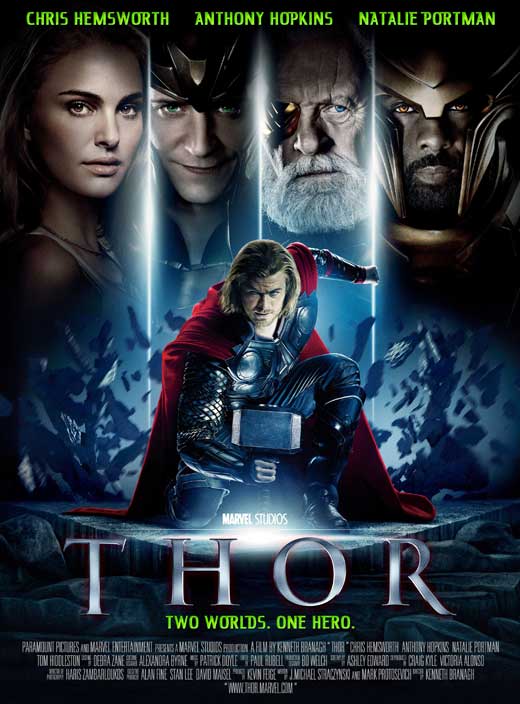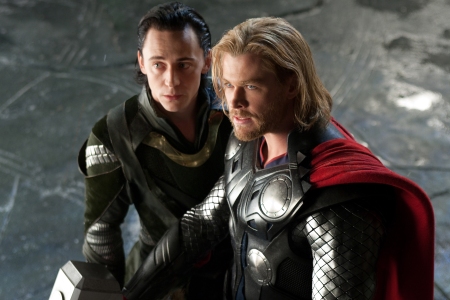

Director: Kenneth Branagh, 2011 (PG-13)
What do you get when you cross a classic
actor-turned director with a classic comic book hero? You get a Shakespearian
version of a graphic novel. Or, turning it around, you get a Norse take on
Shakespeare’s “Henry V”,which is how Kenneth Branagh, that fine actor who
directed Hamlet, conceptualized this
motion picture adaptation of Marvel’s Thor.
The movie opens in the dead of night on the New
Mexico desert. Three astrophysicists, led by Jane Foster (Natalie Portman, Star Wars 1: The Phantom Menace) are chasing some electromagnetic
disturbance monitored from their RV. When they get caught up in the swirling
dust raised by an intergalactic portal, they abruptly bump into a strange man:
Thor (Chris Hemsworth).
After this rapid prologue, Branagh takes us to
Asgard, the home of the Norse gods, as he establishes the mythology in the
extended first act. We meet Odin (Anthony Hopkins, Silence of the Lambs), the king and old “all-father”, Thor, god of
thunder, and his brother Loki (Tom Hiddleston), along with Thor’s band of
brothers.
The themes of the story become evident from this
first act: the father’s wisdom contrasted with the son’s recklessness. The
former will be stable and constant, while the latter will force personal growth
through Thor’s character arc.
The wisdom comes across first when Thor is
young. Odin tells him, “A wise king never seeks out war, but he must always be
ready for it.” Odin clearly symbolizes the patriarch in a pantheon of gods. He
reminds us of the Almighty God, sovereign ruler, worshiped in the Christian
faith. God is the fountain of wisdom -- “wisdom and power are his” (Dan. 2:20)
– and the source or giver of wisdom – “If any of you lacks wisdom, you should
ask God, who gives generously to all without finding fault, and it will be
given to you” (Jas. 1:5). Like Odin, he desires not to go to war, but when
forced to do so, he is willing to pick up the mantle. Satan forced his hand at
creation and God has been involved in a spiritual battle ever since, with the
victory likely to be secured in the climactic battle at Armageddon (Rev. 19).
Act one concludes when Thor in a fit of supreme
recklessness takes his friends to fight against the sworn enemy, the Frost
Giants, via the portal. Despite defying his father’s commands, he brings these
two nations on different worlds to war. Odin, enraged, declares, “You are a
vain, greedy, cruel boy!” With that, he strips Thor of his hammer, his amulets,
and his power and banishes him to the realm of earth, where he is merely a
ripped and cut hunk, not a superhero.
Odin’s wife Frigga (Rene Russo) comments further
on Odin’s wisdom to Loki: “There’s always a purpose to everything your father
does.” This is as true of his exile of Thor as his selection of Loki not to be
king.
Once again, this is reminiscent of God the
Father. He always has a plan. As the prophet Jeremiah declares, God has “plans
to prosper you and not to harm you, plans to give you hope and a future” (Jer.
29:11) His eternal plans encompass everything from creation to culmination,
including personal development for those who follow Jesus: “For those God
foreknew he also predestined to be conformed to the image of his Son, that he
might be the firstborn among many brothers and sisters. 3And those he
predestined, he also called; those he called, he also justified; those he
justified, he also glorified. (Rom. 8:29-30) He certainly does nothing without
a reason and a purpose.
 The second and third acts take place mostly on
earth and comprise Thor coming to terms with his arrogance and recklessness. It
takes a woman to help: Jane. While the fish-out-of-water aspects are touched on
briefly, especially in a café scene, they are not developed. Instead, we see
Thor resign himself to his fate when he finds he can no longer pick up his own
hammer. This pivotal scene sets him on his knees and becomes the turning point
in his growth.
The second and third acts take place mostly on
earth and comprise Thor coming to terms with his arrogance and recklessness. It
takes a woman to help: Jane. While the fish-out-of-water aspects are touched on
briefly, especially in a café scene, they are not developed. Instead, we see
Thor resign himself to his fate when he finds he can no longer pick up his own
hammer. This pivotal scene sets him on his knees and becomes the turning point
in his growth.
Kenneth Branagh has a wonderful cast of actors,
but they don’t have a lot to work with. Hopkins seems to be having a blast as
Odin, the supreme king. He blusters and rages, all-powerfully. Hemsworth, in a
star-making role, certainly looks the part as Thor, even if he speaks campy,
mock heroic dialogue in a somewhat stiff manner. Stellan Skarsgard is more or
less wasted as Erik Solvig, Jane’s mentor and friend. And Portman is a most
unlikely astrophysicist. Yet, despite the superficiality and the staginess of
some of the action sequences, this film is fun. And it does show a hero’s
development.
 The Thor of act one is arrogant and reckless,
caring less for his wise father and more for adventure with his friends. He
worries not what consequences he may cause for others; he simply wants to have
fun by drinking and daring, feasting and fighting. He is a spitting example of
the proverb: “Pride goes before destruction, a haughty spirit before a fall”
(Prov. 16:18). His fall is literal as well figurative, mythological as well as
metaphorical.
The Thor of act one is arrogant and reckless,
caring less for his wise father and more for adventure with his friends. He
worries not what consequences he may cause for others; he simply wants to have
fun by drinking and daring, feasting and fighting. He is a spitting example of
the proverb: “Pride goes before destruction, a haughty spirit before a fall”
(Prov. 16:18). His fall is literal as well figurative, mythological as well as
metaphorical.
The third act of Thor culminates in his growth
and exemplifies another proverb: “When pride comes, then comes disgrace, but
with humility comes wisdom” (Prov. 11:2). Thor learns humility; he learns the
value of life; he learns the significance of relationship. In one scene, he
even adopts a Christ-like mantle of sacrifice. Although his growth is abrupt,
it drives to heart of the movie and instills it with spirit and makes it fun.
As the old song goes, “If I had a hammer, I’d
hammer in the morning, I’d hammer in the evening, all over this land.” Well, when
Thor had a hammer, he was an immature brat. Without his hammer, he learns
humility and teaches us that lesson with a does of humor.
Copyright ©2013, Martin Baggs


No comments:
Post a Comment